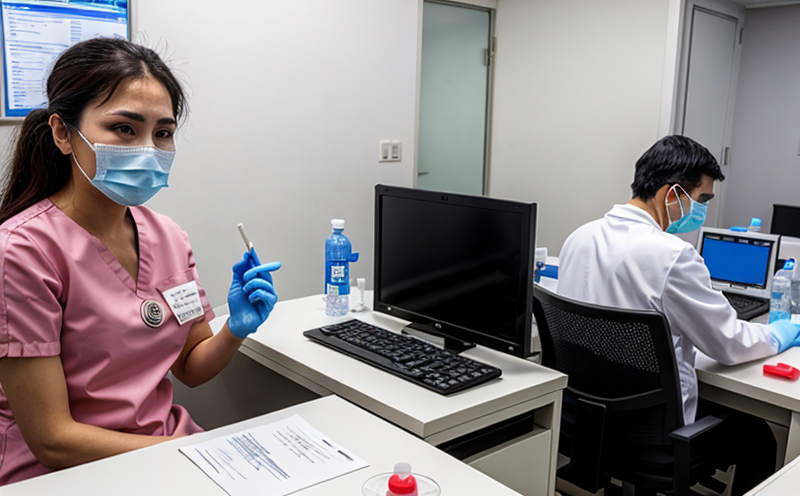Coronavirus Detection Testing in Veterinary Samples
The detection of coronaviruses in veterinary samples is crucial for understanding and managing potential zoonotic diseases. Coronaviruses, a family of viruses that includes SARS-CoV-2 (causing COVID-19) as well as several other strains, can infect various species of animals including cats, dogs, ferrets, and bats. In the context of veterinary samples, testing is essential for early detection, containment, and management of these pathogens.
Our laboratory provides comprehensive services in detecting coronaviruses using advanced molecular techniques such as RT-PCR (Reverse Transcription Polymerase Chain Reaction). This method allows for highly sensitive and specific identification of viral RNA. The process begins with the collection of samples from animals suspected of having a coronavirus infection, followed by rigorous sample preparation to ensure accurate results.
Our team adheres to strict protocols that comply with international standards such as ISO 15189:2017 for quality management systems in laboratories and ISO 6196:2004 for microbiological testing of water. These standards guarantee the accuracy, reliability, and consistency of our test results.
For accurate diagnosis, we employ a range of instruments including real-time PCR machines, DNA sequencers, and automated sample preparation systems. Our laboratories are equipped with state-of-the-art equipment that ensures high throughput and precision in testing. The use of these advanced tools allows us to process samples rapidly while maintaining the highest level of accuracy.
The interpretation of results is crucial for effective management of any detected infection. We provide detailed reports tailored to the needs of our clients, which include information on viral load, strain identification, and recommendations for treatment or further action. This comprehensive approach ensures that veterinarians have all the necessary information to make informed decisions regarding patient care.
In addition to providing rapid results, we also offer follow-up testing services to monitor the effectiveness of treatments and ensure that infections are fully resolved. Our commitment to excellence extends beyond just performing tests; it includes continuous training for our staff on the latest techniques and best practices in virology research.
Applied Standards
The detection of coronaviruses in veterinary samples adheres strictly to international standards such as ISO 15189:2017, which sets out requirements for quality management systems in medical laboratories. This ensures that all aspects of our testing process—from sample collection and preparation through analysis and reporting—are conducted according to internationally recognized guidelines.
ISO 6196:2004 provides additional framework on microbiological testing of water, although its application here is more general than specific to veterinary samples. However, the principles it outlines regarding control measures and quality assurance are applicable across various fields including veterinary diagnostics.
Our laboratory also complies with other relevant guidelines from organizations like the World Organization for Animal Health (OIE) and national regulatory bodies that govern medical testing in animals. Compliance with these standards ensures that our services meet rigorous quality benchmarks recognized globally by healthcare professionals, researchers, and policymakers alike.
Industry Applications
| Purpose | Description |
|---|---|
| Rapid Diagnosis | Identifying coronaviruses quickly to implement immediate control measures. |
| Epidemiological Studies | Tracking the spread of viruses within and between animal populations. |
| Treatment Monitoring | Assessing the efficacy of treatments administered for coronavirus infections in animals. |
| Vaccine Development | Providing essential data on virus strains to aid in developing effective vaccines. |
| Zoonotic Disease Prevention | Identifying potential zoonotic risks early to prevent transmission to humans. |
| Animal Welfare | Safeguarding animal health by ensuring timely diagnosis and appropriate interventions. |
The application of our testing services extends beyond mere detection; it plays a vital role in preventing the spread of diseases, improving public health outcomes, and enhancing animal welfare. By providing accurate and reliable data, we contribute significantly to both human and veterinary medicine.
Environmental and Sustainability Contributions
The work done by our laboratory not only benefits immediate patient care but also has broader implications for environmental sustainability. By accurately diagnosing diseases in animals early on, we prevent unnecessary suffering and reduce the need for extensive treatment regimens that could otherwise lead to increased resource consumption.
Our commitment to using state-of-the-art technology ensures minimal waste generation during testing processes. Furthermore, by collaborating closely with veterinary clinics and researchers worldwide, we help foster a collaborative approach towards tackling global health challenges. This synergy fosters innovation and efficiency in diagnosing diseases like coronaviruses which are of significant concern not only locally but globally.
Through our efforts in this area, we aim to contribute positively to both human and environmental health. Our services play an integral part in creating a healthier planet where animals can thrive without fear of disease outbreaks that could potentially spill over into human populations.





